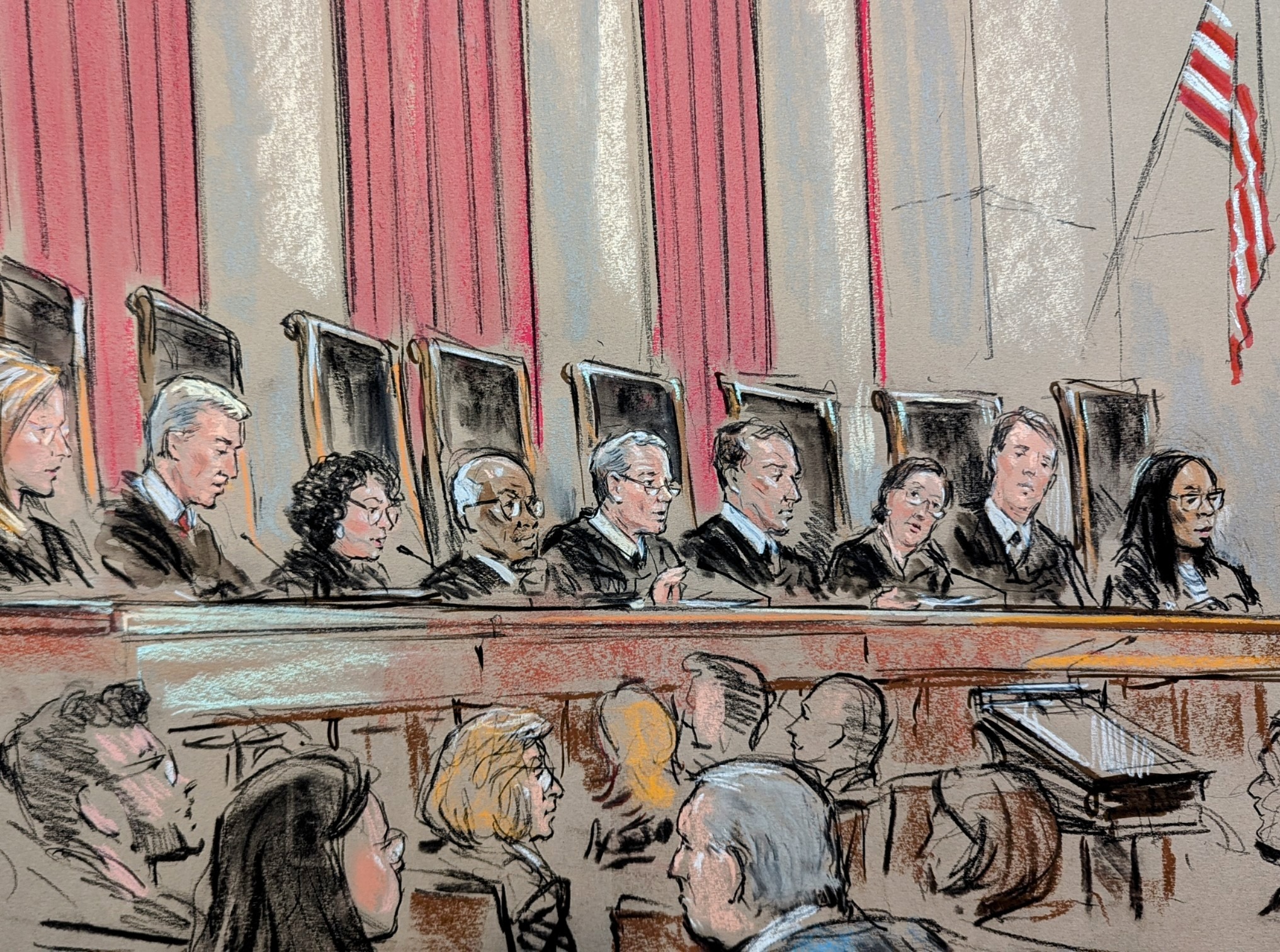VIEW FROM THE COURT
Consider the wild gray squirrel, Kagan rebukes her colleagues as court overrules Chevron

on Jun 28, 2024 at 4:56 pm

Something on television last night seems to have stolen the attention from the Supreme Court in its end-of-term push. But today, the justices will issue three big and newsworthy decisions, taking back the spotlight, with the end of the term now in clear sight.
At the security line to enter the courtroom, I bump into Michael Dreeben, who argued Trump v. United States on behalf of Special Counsel Jack Smith and the Justice Department. He was here on Wednesday but missing yesterday. Since we will not get a decision in the presidential immunity case, Dreeben will presumably try to get here again on Monday.
In the courtroom, a colleague spots Justice Brett Kavanaugh’s mother, Martha Kavanaugh, in the guest section, but there are no spouses again today.
When the court takes the bench, Justice Neil Gorsuch has the opinion in City of Grants Pass v. Johnson, about the Oregon city’s law placing criminal penalties on people experiencing homelessness sleeping in public spaces. As I mentioned in yesterday’s column, Gorsuch sometimes offers very short, abrupt opinion announcements. But today, he is not channeling Al Pacino at the Oscars and he offers a thorough summary of his opinion holding that the enforcement of generally applicable laws regulating camping on public property is not “cruel and unusual punishment” under the Eighth Amendment.
He goes on for nearly 15 minutes, stressing that “homelessness is complex” but that federal judges cannot “match the collective wisdom” of the American people and policymakers in addressing it. He finishes and turns to his immediate left, where Justice Sonia Sotomayor is prepared to deliver her third oral dissent of the term and her second in two days.
“Sleep is a biological necessity,” Sotomayor says, reading from her dissent joined by Justices Elena Kagan and Ketanji Brown Jackson. “On any given night, over half a million people across the country lack a fixed, regular, and adequate nighttime residence.”
She concludes her summary by saying, “I remain hopeful that someday in the near future, this court will play its role in safeguarding constitutional liberties for the most vulnerable among us.”
Chief Justice John Roberts is next up, with a 10-minute summary of his opinion overturning the Chevron doctrine in Loper Bright Enterprises v. Raimondo and Relentless v. Department of Commerce. He explains that the backdrop of the case is a federal regulation about observers on Atlantic herring fishing vessels, but that the court took the case not to rule on the regulation but on the more fundamental question of whether the 1984 decision in Chevron v. Natural Resources Defense Council should be overruled.
Chevron, which requires courts to defer to federal agencies’ reasonable interpretations of federal statutes, is inconsistent with the Administrative Procedure Act and is overruled.
U.S. Solicitor General Elizabeth Prelogar, who had sought to save Chevron during hours of argument in January, looks slightly glum in her seat at the counsel tables.
“Courts, not agencies, are the experts in interpreting statutes, even technical ones,” the chief justice says, in a line not precisely in the opinion but which anticipates the second oral dissent of the day, from Kagan.
“With regret, I dissent for myself, Justice Sotomayor, and Justice Jackson in one of the cases,” Kagan says. (Jackson was recused from Loper Bright.)
As the opinion announcements have stretched past the half-hour mark, some in the public gallery exhibit a bit of languor, but they perk up when Kagan begins discussing western gray squirrels.
“Here it helps to get concrete,” she says, citing the example of a U.S. Fish and Wildlife Service interpretation of the Endangered Species Act with respect to distinct populations of Washington state and elsewhere.
“It’s the Wildlife Service and not any court that knows about” the intricacies of squirrel populations, she says.
Kagan refers to the majority as putting courts at the “apex of the administrative process” and that overruling Chevron threatens to cause a “massive shock to the system,” which echoes a line from Prelogar’s brief about the “convulsive shock” such a decision would cause.
Roberts appears to look up at the clock at the back of the courtroom as Kagan wraps up. There is still more business. He has the opinion in Fischer v. United States, about a charge involving disruption of an “official proceeding” that the Justice Department brought against hundreds of defendants involved in the Jan. 6, 2021, attacks at the U.S. Capitol.
The chief justice has a brief mention of the events of Jan. 6 before getting into a somewhat antiseptic discussion of the fine points of the Sarbanes-Oxley Act, with him using the shorthand “(c)(2)” several times for the relevant provision, 18 U.S.C. § 1512(c)(2).
“Today, we reject such a sweeping interpretation of (c)(2),” Roberts says. It is another defeat for Prelogar and the Justice Department. (Dreeben is likely interested as well because two of the four charges brought by the special counsel against former President Donald Trump are based on subsection (c)(2).)
Roberts announces the slightly surprising lineup that includes a concurrence by Jackson and a dissent by Justice Amy Coney Barrett, joined by Sotomayor and Kagan.
It’s now about 10:50, and the chief justice has one more announcement.
“The court will next sit Monday morning at 10 o’clock,” he says. “At that time, we will announce all remaining opinions ready during this term of the court.”
So, the court is ready to wrap things up. Just about everyone else is ready as well.


